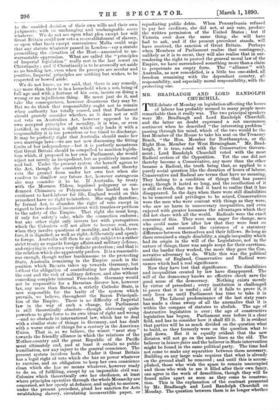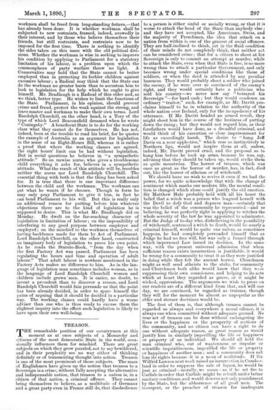. wrong or an injudicious thing. He must just do
it, and MR BRADLAUGH AND LORD RANDOLPH when authority has totally ceased, and that Parliament of labour has probably seemed to many people more should gravely consider whether, as it dare not or will remarkable than it really was. The two principal speakers own marriage laws—we are not now discussing the fitting Bench, " the Hon. Member for Northampton, or the limits of her independence—but it is perfectly monstrous Right Hon. Member for West Birmingham." Mr. Brad- that Great Britain should be compelled to sanction legisla- laugh, it is true, voted with the Conservative Govern- tion which, if proposed in her own Parliament, she would ment ; Lord Randolph Churchill voted with the most reject not merely as inexpedient, but as positively immoral Radical section of the Opposition. Yet the one did not and bad. Under the present system she herself agrees to thereby become a Conservative, any more than the other the Act, though she considers it immoral, and thereby became a Radical, the truth being that, as applied to a eats the ground from under her own feet when she purely social question like the duration of hours of labour, resolves to disallow any future Act, however outrageous Conservative and Radical are terms that have no meaning. workmen shall be freed from long-standing fetters,—that has already been done. It is whether workmen shall be subjected to new restraints, framed, indeed, avowedly in their interest, and by those who believe themselves their friends, but still restraints, and restraints now to be imposed for the first time. There is nothing to identify the sides taken on this issue with the old political divi- sions. Whether the workman is wise in seeking to improve his condition by applying to Parliament for a statutory limitation of his labour, is a problem upon which the commonplaces of party warfare throw no light. A Conservative may hold that the State cannot be better employed than in protecting its feebler children against excessive labour ; a Radical may think that the State can do the workman no greater harm than to accustom him to look to legislation for the help which he ought to give himself. Mr. Bradlaugh is a Radical of this older and, as we think, better type. He wishes to limit the functions of the State. Parliament, in his opinion, should prevent crime and fraud, protect the weak against the strong, and leave master and workman to make their own terms. Lord Randolph Churchill, on the other hand, is a Tory of the type of which Lord Beaconsfield dreamed when he wrote " Coningsby." A beneficent State is to do for the working class what they cannot do for themselves. He has not, indeed, been at the trouble to read his brief, for he quotes the example of Australia as an argument for legislation in the sense of an Eight-Hours Bill, whereas it is rather a proof that where the working classes are agreed, the eight hours' limit can be had without legislation. But in social questions he believes in "a sympathetic attitude." So an unwise nurse, who gives a troublesome child everything it asks for, believes in a sympathetic attitude. What the result of this attitude will be, troubles neither the nurse nor Lord Randolph Churchill. The essential thing with both is that the thing has been asked for. It is true that there is one important difference between the child and the workman. The workman can get what he wants if he chooses. Though in form he may only pray Parliament to give it him, in fact he can bend Parliament to his will. But this is really only an additional reason for putting before him whatever objections there are to the kind of legislation he is supposed to desire. This is what Mr. Bradlaugh did on Monday. He dwelt on the far-reaching character of legislation in limitation of labour ; on the impossibility of interfering to any good purpose between employer and employed ; on the mischief to the workmen themselves of having backbones made for them by Act of Parliament. Lord Randolph Churchill, on the other hand, constructed an imaginary body of legislation to prove his own point. As he reads the Statute-Book, "from the day when the first Factory Act was passed, Parliament has been regulating the hours and time and operation of adult labour." That adult labour is nowhere mentioned in the Factory Acts makes no difference to him. As in the lan- guage of legislation man sometimes includes woman, so in the language of Lord Randolph Churchill women and children include grown -men. It is easier, no doubt, to invent a precedent than to discover a reason, and Lord Randolph Churchill would fain persuade us that the point has been already decided, in order to spare himself the pains of arguing that it should be decided in a particular way. The working classes could hardly have a worse adviser than one who is thus ready to excuse them the slightest inquiry into the effect such legislation is likely to have upon their own well-being.







































 Previous page
Previous page